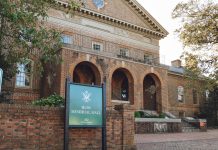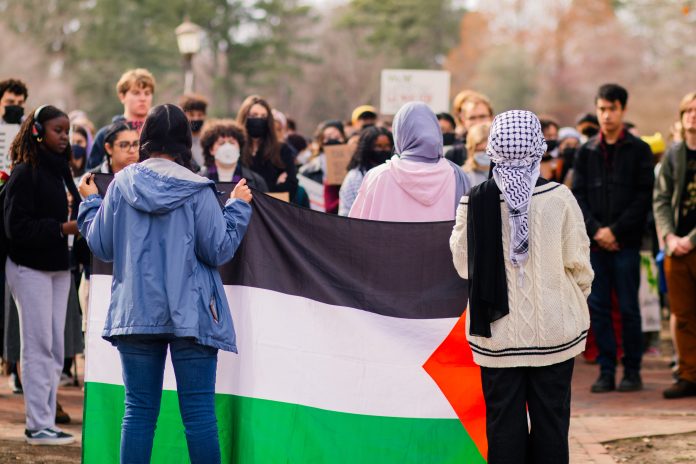Alan Kennedy J.D. ’09, M.A. ’09, Ph.D., is an assistant teaching professor of public policy. The views expressed are his own. Email him at ahkennedy@wm.edu.
The view’s expressed in the article are the author’s own.
Free speech and peaceful protest are prerequisites to democracy that must always be defended.
At the College of William and Mary, a public university, they are not only ideals to uphold but also rights under the First Amendment to the Constitution. Students, like faculty, do not lose these basic rights at the schoolhouse gates, even if their opinions are unorthodox, unpopular or controversial. And yet, at least for Students for Justice in Palestine, the administrative restrictions have chilled student speech.
The Flat Hat reported on Jan. 23 that the College’s Community Values and Restorative Practices department, part of the Dean of Students office, placed the SJP on probation because some students temporarily blocked a crosswalk near Blow Memorial Hall after a protest outside a Board of Visitors meeting. Despite crosswalk loitering not being part of the protest or approved by the group, the College nonetheless put the organization on probation.
One member of SJP, who was so fearful they requested anonymity from The Flat Hat, felt like they were under “constant targeting,” and that “other members of the community aren’t always given the same treatment.” At a student walkout on Feb. 8, another member of the group called the probation decision “petty” and “unjust.” At a protest on March 1, professor William Fisher said that “intimidation” is discouraging students and faculty from speaking freely.
To evaluate concerns that SJP has been treated differently than other registered student organizations, I requested — and received — the public records of decisions by Community Values and Restorative Practices to warn, discipline, suspend, put on probation or revoke recognition of any student organization, from July 1, 2021 to Jan. 30, 2024.
These records suggest that protest-related policy violations are treated more severely than others.
Out of 32 decisions, 28 of these involved fraternities, one involved a sorority, one involved an athletic team and two involved SJP. Out of 15 organizations, five received probation. Only the two decisions against SJP involved protest-related policies. The other decisions ranged from hazing to alcohol to drugs to weapons to damage to disruption.
Except for SJP, probation was only given for alcohol and hazing. 10 other organizations received only warnings — several received multiple warnings – for violations involving hazing, alcohol, drugs, weapons, damage to facilities and class disruption. Regardless of the violation, most groups were punished less severely than SJP.
In other words, the College’s own public records indicate that the administration may not be as protective of “the right to peaceful political expression” as President Katherine Rowe stated on Nov. 1, 2023. The “Use of Campus Facilities” policy is also more restrictive than it should be, stating that constitutionally protected expression is protected “in university-controlled facilities” while prohibiting student protests and demonstrations everywhere except “on outdoor property.”
Members of SJP and organizations with similar political viewpoints are right to be concerned that the College has punished protest-related violations more severely than other violations and that it has punished SJP more harshly than other groups. Thus, it comes as no surprise that students and faculty are afraid to express their views.
Admittedly, it is difficult to discuss the barbaric massacre of 1,200 Israelis by Hamas on Oct. 7, 2023 and Israel’s retaliatory invasion of Gaza, which has killed more than 30,000 Palestinians, displaced two million Palestinians and caused children to die from malnutrition and dehydration.
Yet it is worse to ignore what President Joe Biden acknowledged in the State of the Union is a “humanitarian crisis.” Despite opposition from Israel’s Prime Minister Benjamin Netanyahu, the U.S. must push for a ceasefire, prevent famine and take real steps toward a two-state solution.
Protests calling for a ceasefire, protest votes in the primaries and images of starving children in Gaza pushed Biden to finally propose a “ceasefire” and draw a “red line” against Netanyahu’s plan to attack Rafah, where hundreds of thousands of displaced Palestinians have sought refuge.
That is the power of peaceful protest, and that is why the College’s decision to punish SJP for unauthorized, isolated acts by some group members is so problematic.



































